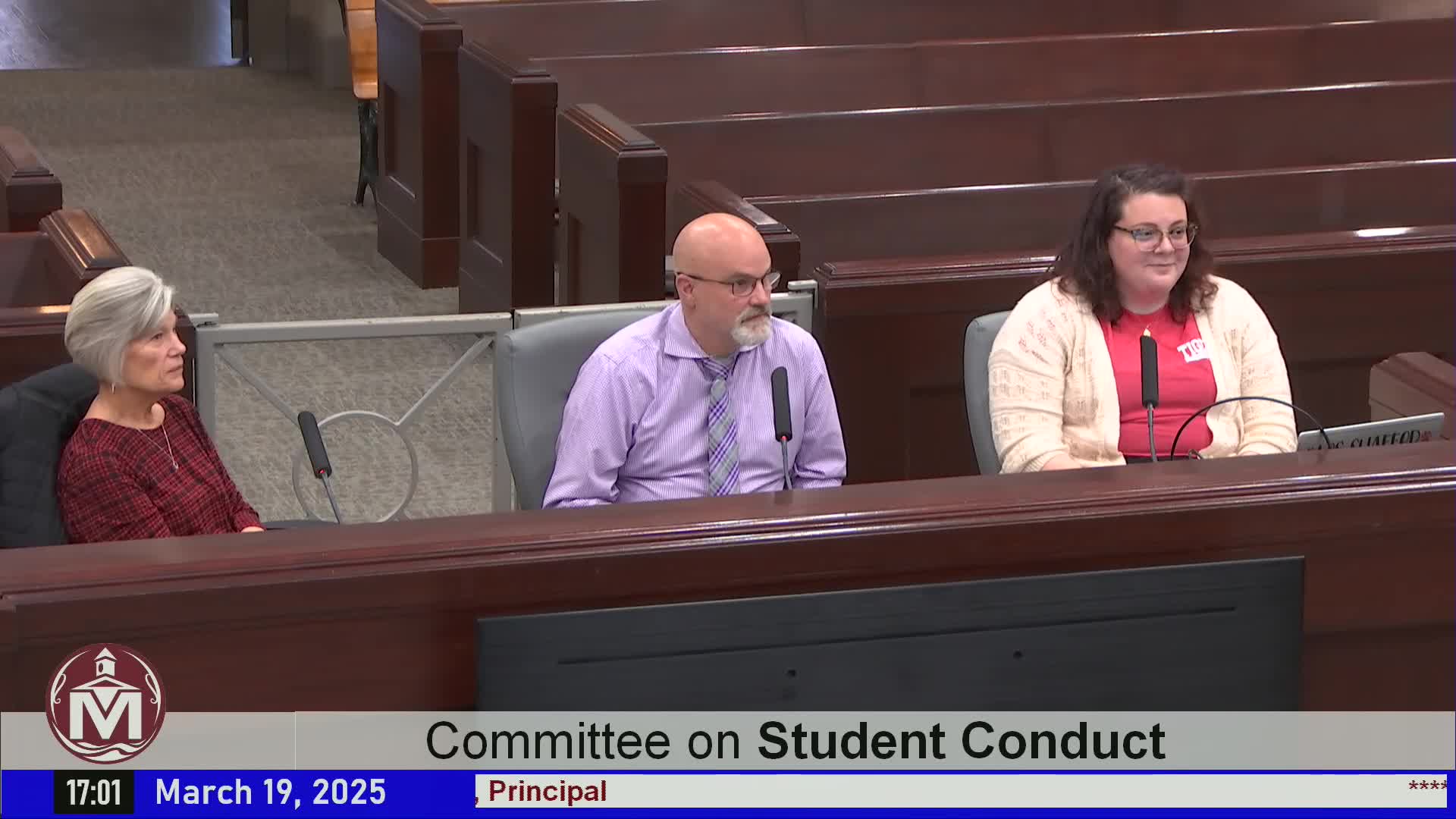Jewett Elementary credits schoolwide behavior plan for sharp drop in office referrals
Get AI-powered insights, summaries, and transcripts
Subscribe
Summary
Jewett Elementary told the Committee on Student Conduct that a schoolwide behavior plan using consistent language, incentives and tiered supports coincided with a large decrease in office referrals this year. Staff described classroom documentation, a color-coded reward system and tier 2 interventions as next steps.
Jewett Elementary Principal Abayosek and special education teacher Kate Schafer told the Committee on Student Conduct on March 19 that a schoolwide behavior plan has coincided with a marked drop in office referrals this school year.
The school set a yearlong goal to cut total office referrals by 10% (from 75 to 67) and rolled out common expectations — “be safe, be respectful, be responsible” — posted around the building, Schafer said. The plan pairs clear teaching of expectations with a reward system that uses “Tiger Paws” and color-coded tokens to track where positive behavior is occurring.
"Our work last year revolved a lot around developing the language that we wanted to use," Schafer said. "Following the be safe, be respectful, be responsible, we set up different expectations for those common areas." She added that the color-coding helps the MTSSB team see whether successes are happening in the cafeteria, hallways, recess or special-area classes.
Nut graf: Jewett staff told the committee the combination of consistent language, staff training, classroom documentation and tiered supports has reduced disciplinary incidents seen in the office and allowed staff to identify students who need targeted help earlier.
School staff described multiple components of the plan: lesson plans to teach expectations at the start of the year, a staff training rollout so veteran and new teachers used the same language, a positive-acknowledgement structure (Tiger Paws and Tiger Bucks), and use of Aspen note-taking to document repeated classroom-managed behaviors. Schafer said the team reviewed a district document that outlined the distinction between teacher-managed and office-managed behaviors and then aligned practice across classrooms.
Schafer described incentives in detail: classes earn paw nominations for following expectations; when the building reaches 60 paws the school holds a celebration. Individual classrooms keep jars to track their own paw totals, and the team recently added color-coded paw prints so they can visually see which locations (cafeteria, hallway, recess, special classes) are generating the most acknowledgments.
Staff said they are also using documentation in Aspen notes (not formal office referrals) to track repeated classroom-managed behaviors so they can identify students who may need tier 2 interventions, like check-in/check-out or social skills groups. "We can do our Aspen referrals, but Aspen note taking... allows us to document repeated behaviors that we're seeing," Schafer said.
Schafer gave the committee specific counts the school has been tracking: the school initially cited a full-year total target of 75 referrals; Schafer later reported that "as of this date last year, we had 58 total office referrals," and that "as of this date today, we have 17 total office referrals." She attributed the decline to staff buy-in and daily reinforcement of the three expectations.
Schafer said about three students are currently enrolled in the check-in/check-out tier 2 program, attached to a staff member who reviews daily goals and celebrates progress without delivering new consequences. She also described smaller social-skills lunches and other small-group supports for students who find the large cafeteria overwhelming.
Committee members praised the program’s clarity and results. Committee member Watt said, "You've blown your goal out of the water," and Committee member Gonzales and others highlighted the value of the program’s nonjudgmental approach and its potential long-term benefits as students move to higher grades.
Ending: Jewett staff told the committee the next steps are continuing tier 2 supports, finalizing a district data dashboard for referral breakdowns, and evaluating whether additional targeted programs are needed as the plan continues to operate.
